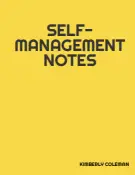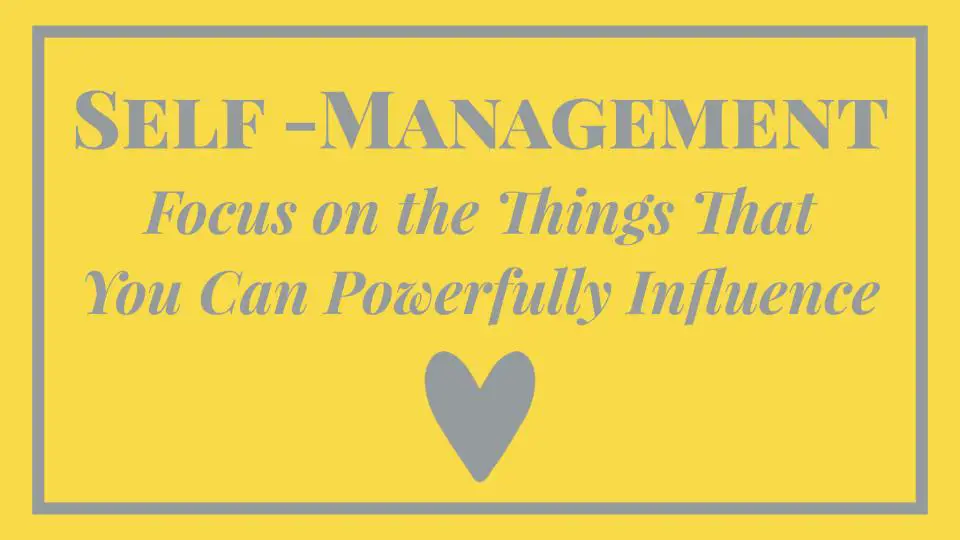
Last month, I presented a session on self-management skills at a Parenting While Working From Home virtual event. Now that it is over, I can share the notes from my session with you.
Self-Management Skills
Since self-management is the real issue, it’s important to focus on the things that we can control. Even the word control isn’t 100% accurate. If nothing else, 2020 taught us that we don’t really control much so let’s reword my presentation title to “Self-Management: Focus on the Things That You Can Powerfully Influence.”
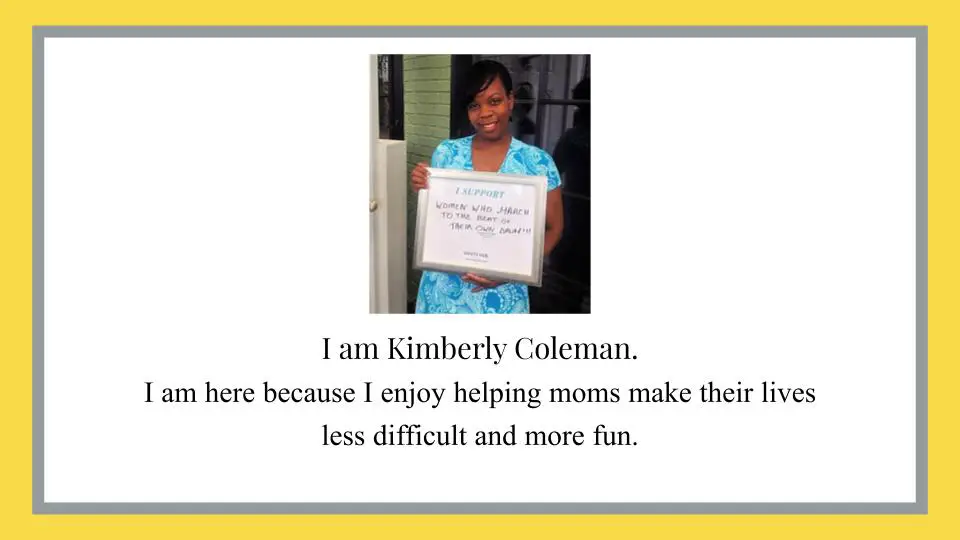
My name is Kimberly Coleman. As the sign that I’m holding in the picture states, “I support women who march to the beat of their own drum.” I am here because I enjoy helping moms make their lives less difficult and more fun. Self-management skills are key!
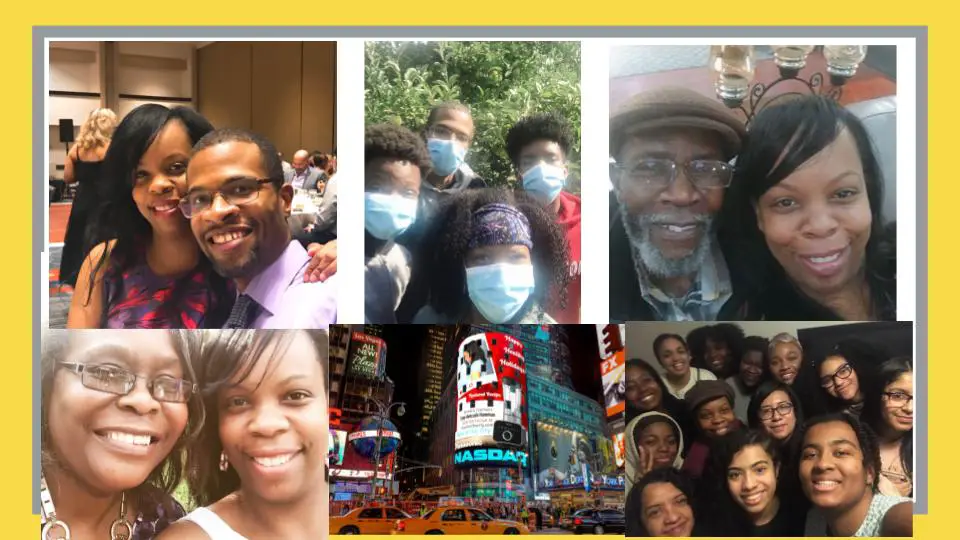
Like many of you, I juggle many roles. I’m a wife to an amazing public high school math teacher, a remote-schooling mom to two wonderful teen sons, a daughter to two fun-loving parents, a work-from-home professional content creator, a volunteer leader at my church and so much more.
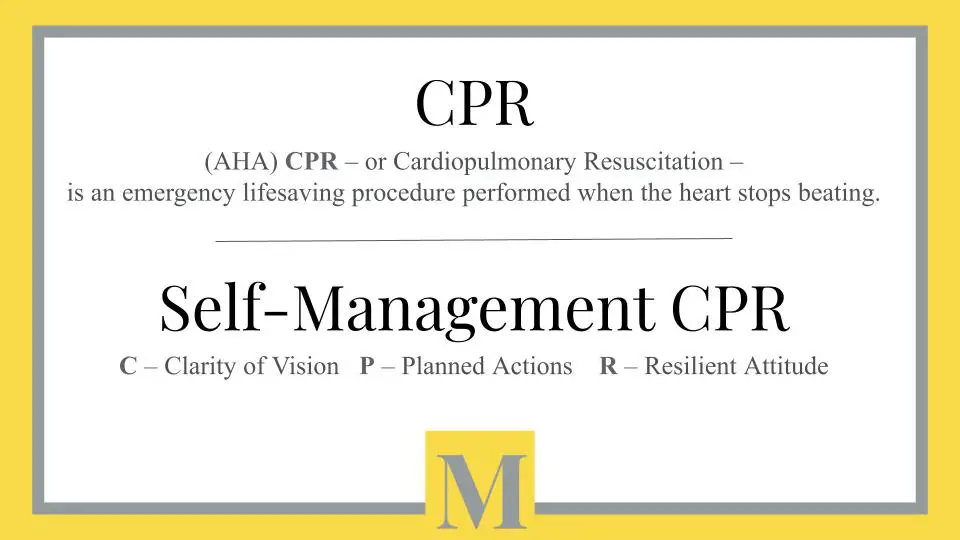
I like acronyms so I’ll be discussing self-management CPR. I really believe that self-management skills can be a quality of life saver – especially for parents who work from home. Many of us are doing our paid work while taking on more home and family responsibilities since many of our kids are distance learning. It can be a lot – both mentally and physically. I hope that these three self-management CPR strategies will help to bring more joy and peace into your lives as work-from-home parents.
C – Clarity of Vision P – Planned Actions R – Resilient Attitude
Clarity of Vision
The C in CPR is for clarity of vision. A question that I like to ask (to both others and myself) when we are unhappy with certain areas of life is: What do YOU want? It really is a discipline to train ourselves to focus on what we want instead of what we don’t want. That is why this is one the most important self-management skills. My all-time favorite quote from William Shakespeare is so relevant:
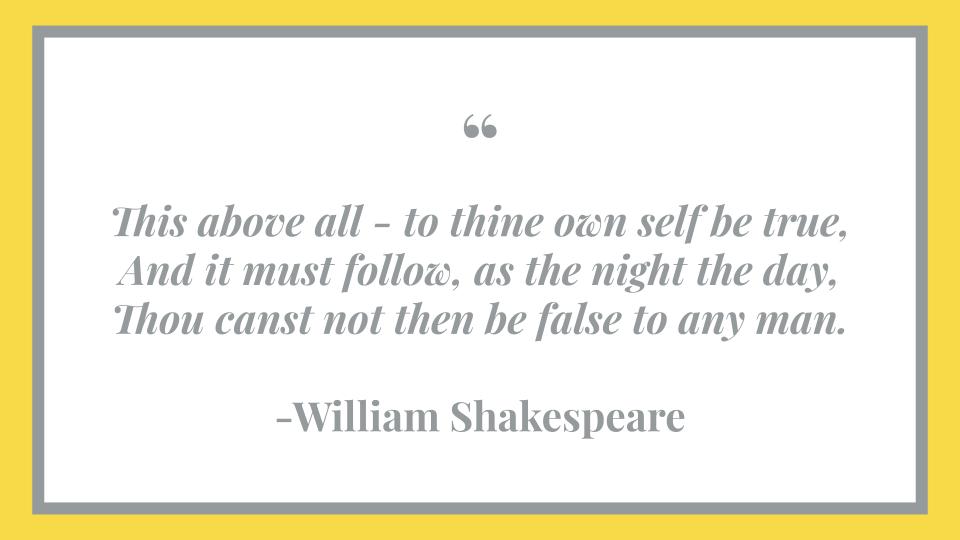
It’s a powerful reminder to listen to our inner voices when making life choices.
In order to get clear about what we want our lives to be like, it’s important to ask the right questions.
A couple of questions for you to consider.
1. What is my priority? By definition, there can only be one thing that comes first. The etymology of the word priority defines the word as the “fact or condition of coming first in importance or requiring immediate attention; thing regarded as more important than another or others.”
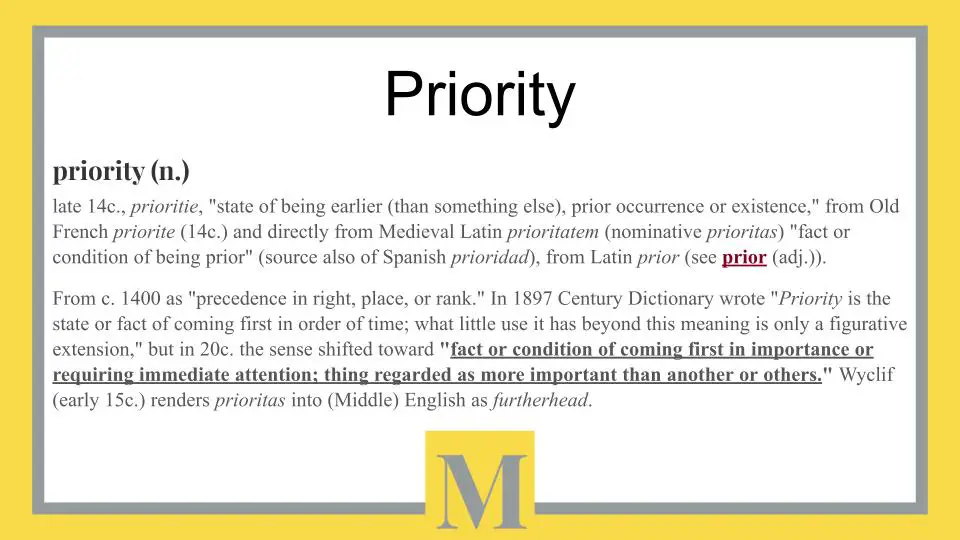
After determining your priority, it’s also good to ask:
2. What are the next most important areas of my life? What else is important to me?
One of the most important things to remember is that your priorities and what’s important to you don’t have to make sense to anyone else. You’re asking yourself what do you want, not what others want or think that you should want. Instead, pay attention to both your head and your heart.
Other questions that are good to consider at this point:
- What is something that I enjoy that is currently missing from my life? How can I incorporate that into my current reality?
- If I were to look back a year from now, what would I like to see has changed?
- WHY do I really want to change?
- If fear was a non-issue, what goals would I pursue?
Action Step
The first set of action steps is for you to write down your top priority and up to 2 other areas of life that are important to you right now. Next to each thing, take some time to write out what you want in that area. (What do you want to have/do/be/give? How do you want to FEEL in that area?)
Top Priority




Also Important








For me, Physical Fitness is my current focus area. It was the only area that I didn’t hit my 2020 goals. That is why I have decided to make physical health my 2021 priority.
Planned Actions
The P in CPR stands for planned actions. Planning our actions allows us to break down our vision into bite-sized goals. That is why this is one of the essential self-management skills in my opinion. Keep it simple. Decide what daily or weekly actions that you are willing to commit to in order to make progress towards making your vision a reality.
Remember that you (almost) always have a choice regarding the things that you do so take ownership of your choices and plan accordingly. If something aligns with your vision, then include it. If it doesn’t, then strongly consider whether it should be a yes or no. Whenever you say yes to a commitment, just realize that you’re saying no to something else. Your choices make a difference so make good ones.
It takes courage to live according to our plans. This can be especially challenging for people pleasers. If that’s your reality, get help with setting boundaries – either from someone in your personal circle or a professional.
As entrepreneur trainer Fabienne Fredrickson, says:
Speak up when something isn’t working for you…
Fabienne Fredrickson
Even when it’s the people you think you are obligated to “please.”
I share my detailed weekly planning routine in my 4 Habits That Will Increase Productivity at Work post. Basically, I do a brain dump of everything that I can think of that needs to get accomplished for the week. I first schedule calendar items (like business meetings or doctor’s appointments).
Then, I go through the rest of the list and use my “D” system – do, dump, delegate or defer – based on my current priority and what’s important to me. I don’t just decide what I’m going to do but I also plan when I’m going to do it. *With advances in technology, I have also added “automate” as an option. I just can’t think of a synonym for automating that starts with a “D”.
Action Step
The second set of action steps starts with planning weekly actions for the area(s) of life that you wrote down in Step 1. Don’t overwhelm yourself. Keep it to 1 to 3 actionable items for each of your chosen areas. Remember that the goal is to get you closer to what you want in life. Planning is not enough…you actually have to do what you plan!
“Top Priority” Action Items



“Also Important” Action Items






Since Physical Fitness is my current focus area, I have 3 things that I do each day. (There are 5 main areas of physical fitness – nutrition, hydration, exercise, sleep and minimizing stress.) The latter two come easily to me so I focus on the other 3. My weekly action plan looks like this:
- Hydrate adequately. (6+ cups of water/day)
- Exercise daily. (30+minutes/day)
- Eat mindfully. (For me, that means primarily eating meat/fish and veggies except for on Friday family nights.)
Resilient Attitude
The R in CPR stands for resilient attitude.
According to The American Psychological Association, resilience is
the process of adapting well in the face of adversity, trauma, tragedy, threats or significant sources of stress
The good news is that we can learn how to build and improve this valuable skill. That is why I have included this as one of my top three self-management skills. Resilience is like a muscle…it can grow if we cultivate it. As humans, we can learn to adapt and adjust to challenges and disruption. Focusing on what we can control or powerfully influence helps to strengthen a resilient attitude.
Even in challenging situations, we can be proactive by considering different options and solutions. We can learn tools to manage and to problem-solve. It’s okay to struggle. We don’t have to be strong and perfectly self-managed all of the time. That is unrealistic. We’re not robots. We can acknowledge our emotions and still not allow them to control us and prevent us from going after our goals.
Resilience is essential because there are limits to our vision and plans. For instance, consider that we’re almost into a full year of pandemic living. There have been unprecedented disruptions to our daily lives. Many of our children are remote-learning – either part-time or full-time. Many of us have lost a lot – experiences, childcare, jobs, income and even loved ones – due to COVID-19.
In addition, as parents, we have concerns about our kids’ emotional, social and academic health. While resilience allows us to eventually bounce back even stronger than before, it’s so important that we give ourselves (and others) abundant grace.
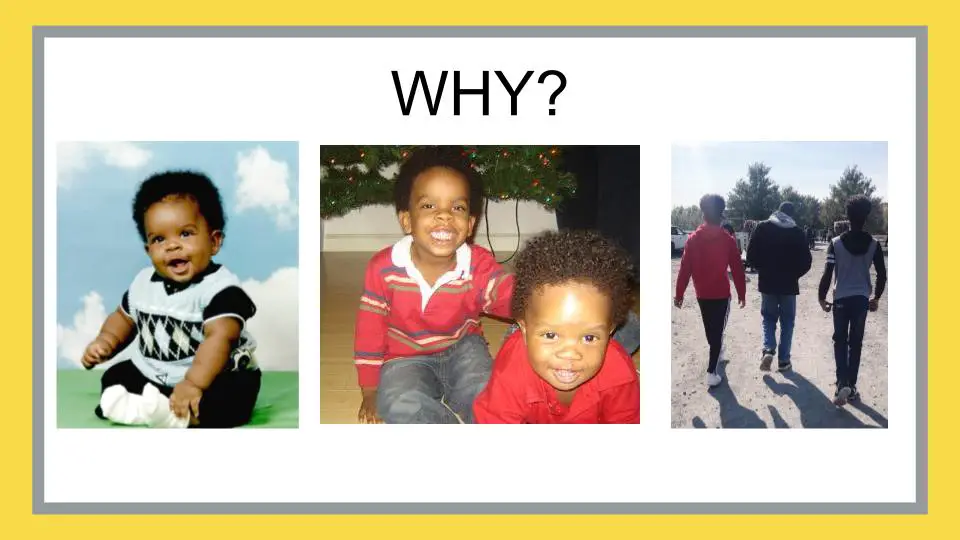
I’ll end by sharing that Remembering my WHY is the number one thing that helps me to be resilient. I became a work-from-home mom so that I could be available time-wise for my sons while still helping to provide financially for my family. I’m very grateful that I have been able to do both for the past 16+ years.
Everyone has a different “WHY”. Figure yours out and keep it at the forefront of your mind. I also recommend having it written down somewhere visible. That visual reminder provides encouragement on the most challenging days.
Action Step
The last set of Action Steps include coming up with a resiliency plan for the area(s) of life that you wrote down at the beginning. Anticipate challenges and disruptions and plan how you will respond. Most importantly, be clear about your WHY.
My “WHY”

“Top Priority” Resiliency Plan



“Also Important” Resiliency Plan






Since Physical Fitness is my current focus area, I’ll share part of my resilience plan…
- Since I’m a results-oriented person, it’s more of a mental thing. I anticipate that there will be weeks when I do the right actions and the scale doesn’t budge. (Notes to self: Be patient. Reassess. Remember that I’m 47, not 27. Don’t throw in the towel since “it’s not working anyway”.)
- I’m also someone who gets bored very easily so I know that I need to switch up my workout routine. Kickboxing (Cobra Kai!), dance workouts, etc. help with variety.
- Lastly, I keep my WHY top of mind. In my opinion, health is a gift from God so I want to be in good health. I also feel better – mentally and physically – when I’m making healthy choices.
I want to enjoy a long, healthy life with my loved ones. I’m aware that I can’t control that. (I know super health-conscious people who have become ill or died young.) I can powerfully influence my health outcomes based on my choices though. That is what self-management is all about – doing my part!
I hope that you found my self-management skills session notes helpful. In the session, I also mentioned that you can find some of my favorite self-management resources along with the FREE 50-Page Remote-Schooling Moms Ebook at https://www.mominthecity.com/self-management/.
As always, you can also connect with me directly at [email protected].
If you enjoyed this post, please share it. In addition, consider signing up for my weekly email newsletter so that you don’t miss future updates. Thanks!
